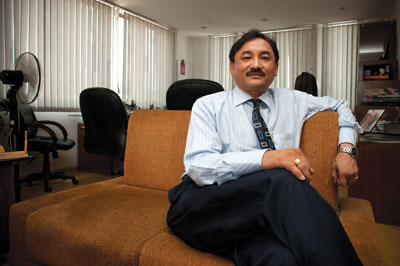It has been long since I have read something immensely encouraging about Nepalese entrepreneurs, the likes of Mr. Prem Bahadur Shrestha. He is the vivid reminder, as such, the cornerstone to put this country on a sound financial and economic footing.
Before success can sneak up on his enterprise, I'd invite him to have a sneak-peek at today's global financial and economic situation, if you please:
While the world economy is going belly-up!
It is really no use slogging your guts out. A broad spectrum of opinion will confirm that today's global financial meltdown stemmed right from its center. That means it is a crisis of the system itself not the crisis in the system.
What you require to do is to rectify the underlying imbalances in spending and saving. The future generations shall never admit the privatization of profits and nationalization of losses! So why, you need changing your prism of optic regarding the overarching paradigms of those financial hubs of activity such as Wall Street in NY, The City in London, Frankfort, Tokyo, Paris and et al.
Was not that something which represented a hubris of the past Anglo-Saxons' mindset, full of go and triumphant? The throwaway society ended in a mismatch of overspending on credit leaving everywhere the bumps and hollows.
Nobody has still penetrated into the secret workings of our mind. Even then we must tidy up so as to understand the hidden undercurrents of the Americans' such spree in the recent past for spendthrift impulses.
Mankind created different systems to control and rationalize both the upstream and downstream flows of events of life cycle. From the very moment parents think of the conception of a baby, he is born and brought up within a system and he becomes part and parcel of the same, that means, he inherits all the qualities either good or bad of the society, they include the system of values that parents imbibe him with, thinking it most suitable for the child lest he revolts and breaks away the links from the initial status quo when he earns his majority.
Honestly, it is so fortunate that you are not born in a country with rash and appalling caste system. It is the evidence of human pettiness to consider other persons inferior to you because of their vocation.
Somebody who makes your clothes, your kitchen utensils, who manufactures your different tools for daily use, should be considered inferior to you; on what grounds? Whoever were responsible for such discriminating societal rules were worth going to a booby hatch but they already passed away and their misdeeds as well as inheritance are so heavy to bear that ended up by making Nepal and India lag behind the Occident thanks to this most untoward and undermining societal drawback.
But in the Western world there are other systems that are as noxious as caste system in the Indian sub-continent. What a bummer!
It ain't any secret whatsoever that before the English arrived in Indian sub-continent it is said that this sub-continent was amongst the richest in the world. As of now, the Western countries are quite in advance due to the scientific achievements which the Orient in general and Indian sub-continent in particular have yet to fill in the gap.
In today's financial and economic turmoil let us bring to light some of those reasons that marred the holistic financial, economic, free market and capitalistic system.
First off, those scholars of the Business Schools who learn and train themselves to be right persons in the right places, who think not only to engender substantial capital gain out of what they do by calling after finishing their studies, but also naturally think of helping the society where they belong to advance on the path of progress: if they remain detached from the inconveniences of the same they are not considered to be the successful and meritorious managers.
Let us have a look at the latest 'mantra' of new kind of global management taught in the prestigious Business Schools around the world.
According to the "new manual of savoir-faire" the global management should be excelled by means of "3Bs":
Bounding: Perimeter of action. It signifies whether your actions are meant for local market or international one, cut in zones of actions.
Binding: Moral obligations and smart collaborators mainly selected amongst the alumni and business relationship, and
Building: Infallible results obtained by means of combination of the application of proven know-how and cutting-edge technology.
Besides, you should know that the pluses and minuses are both inclusive in the hypertrophy of sensibilities. It is therefore under your sole responsibility to first discern and then decide.
When you are the one who is in charge of the direction or the steersman, you have absolutely no right to maneuver wrongly because your decisions can affect the future of your society's survival. For that very reason only the best and already tested policies are taught to those who aspire to be the future CEO of an Enterprise. The higher education therefore is the short-cut to learn to be more responsible of your acts.
It seems that these schools have failed in their mission to make the appropriate Captains of industry. What happened?
There entered the human factors. A decision always depends upon Who, Why, Which, Where, Whose, Whom and How. A man remains after all a man. Every individual has his own parameters as well as background. They include precisely the greed, the lure of gain, other conspicuous temptations and what not.
Secondly, how's about giving a rapid thumbnail sketch of the situation, i.e., to tone it and to hone it and then scrutinize it as to what really went wrong in the global financial and free market system?
I for one have a lame question whether the external factors such as the interest groups represented by different lobbies are not involved in the slow decaying of the system from inside.
In Brussels you'd be appalled to find all these lobbies everywhere trying to take a pop at the decisions of the EU commissioners. If we go by what the papers say the Capitol Hill in Washington has the stacks of them and if we follow the warnings given by the late US President Dwight Eisenhower, these lobbyists, mostly representing the lethal arms businessmen, international holdings and cartels with huge interests disseminated everywhere throughout the globe, are quite harmful for the generations to come because of their psycho-rigidity of mindset, their biased engagement toward a particular society creating a conflict of interests.
It is therefore necessary to wipe them out from the decision making centers for good so that they do not siphon off the funds of these international organizations, using thereof as a bargaining chip, and at length the real democracy is not confiscated by the outsiders who have no legitimate voice to interfere where many vital interests of human progress are involved..
Such practices of the past are proved to be illegal, though, and must be banned because it is an another type of corruption that has slowly eaten away the best part of our administration.
Thirdly, no more tax havens should be tolerated; anyway, now it is most likely that almost every important bank will have a watchdog appointed by the authorities concerned.
Fourthly, no more proliferation of hedge funds should be admitted. Their only reason to be is to make maximum of profit in minimum of time and encourage the 'casino economy.' When they poke their noses you smell them coming right away and getting incrusted because they are helped mostly by the banks at the time of loan requirements.
With implicit complaisance of banks they can make a sort of a raid on your society. For instance, they pay hardly 25 percent of the whole price then they send to you a sort of a mortician or liquidator who dismantles your society or the building, to take an example, wholesale where many apartments are rented to different tenants.
That mortician will sell those apartments one by one making a substantial profit both for the hedge fund society and the bank. And the poor tenants are kicked out like fag ends. This kind of leveraged buyout activities must be proclaimed outlaw.
Fifthly, point of fact, in the past the USA bought almost everything on credit whereas the Asians were all in the process of accumulation of savings. Now the wind has turned because the USA also has become the country of small savers and investors.
The Asians beginning with Japan, South Korea, China and Southeast Asian countries became prosperous by means of making the dumping of goods onto the EU and the US markets through the chain of Walt-Mart in the name of the global free market to the detriment of the so called rich countries which had erstwhile the highest purchasing power.
For once, as the wind has turned, slowly the local goods will find shelves of the shops with customers, the salaries will get increased and that will be the end of low-cost and follow-up transactions. This has nothing to do with protectionism but it is like replacing the speculation of the financial capitalistic system which proliferated so far cushioned by cheap manpower exploitation of the rural area in BRIC (Brazil, Russia, India, China) and elsewhere.
All in all, it brought nothing strikingly positives far outweighing the negatives, insomuch, that the very essence of market economy should get jeopardized by creating millions of people jobless in the ancient so called rich and prosperous countries.
Above all, the new actor of Asia namely China must abide by the international business rules and regulations. Because her bent on using the neighboring countries with soft tax policies to serve as Trojan Horse to invade the regulated markets as she is doing in the EU with the tacit help of North African countries infringing on all existing laws of exportation by proclaiming some of those Made in China brands such as tea, clothes and some commodity articles to be their local products simply by changing the packaging and tags into Made in Morocco, Made in Tunisia and Made in Algeria meant for exportation is simply unacceptable.
Because this practice of peddling all throughout delusions and violations of rules and regulations of international trades and transactions become extremely harmful for everybody in the long run.
And equally using the border easy access of Nepal to invade Indian market is simply inadmissible and unfair from the part of China in today's open market world where every country is earnestly trying hard to best revive the local morass and moribund factories and consumption to create new jobs.
A country with a currency without sufficient purchasing power will never help stimulating free market society to prosper.
If those export-bent countries like Germany and China asphyxiate other countries where they can sell their products but providing no chance for the locals to create new jobs to continuing having revenues of their own, one day the time comes that there would be none to buy the imported products.
That is called foreseeing the future in order to establish the loyalty of consumers of their products in immediate future.
Lastly, to paraphrase the former Chancellor of the Federal Republic of Germany, Helmut Schmidt: "Today's investment creates jobs for today and profit for the generations to come."
And when your home is on fire first you extinguish it; only then you think of helping your neighbors.
When the chips are down, do not lose hold of your commonsense.




